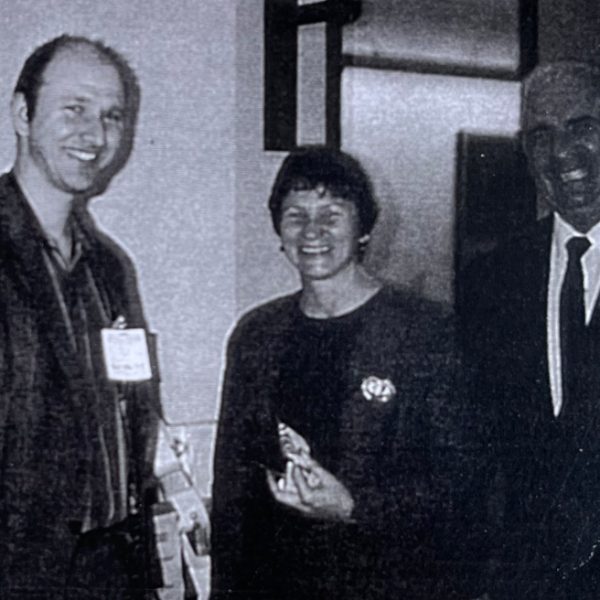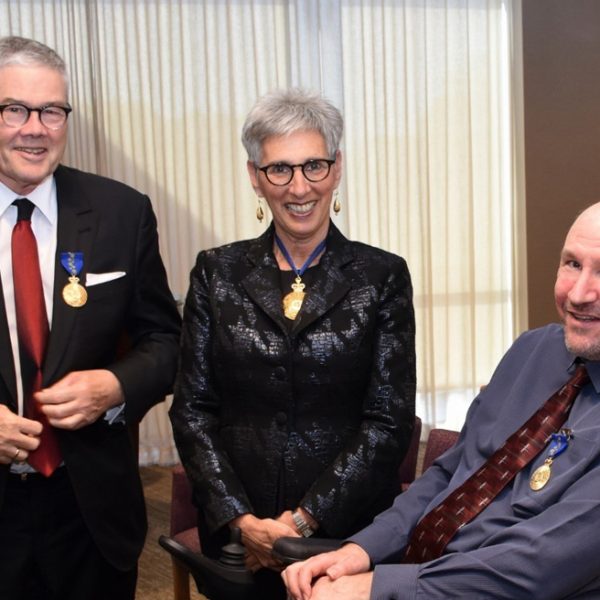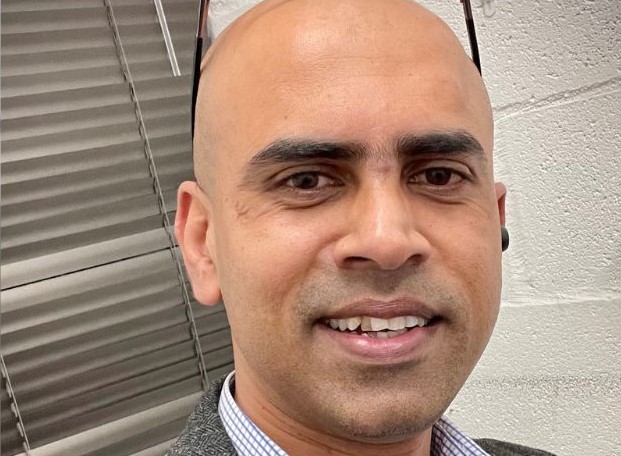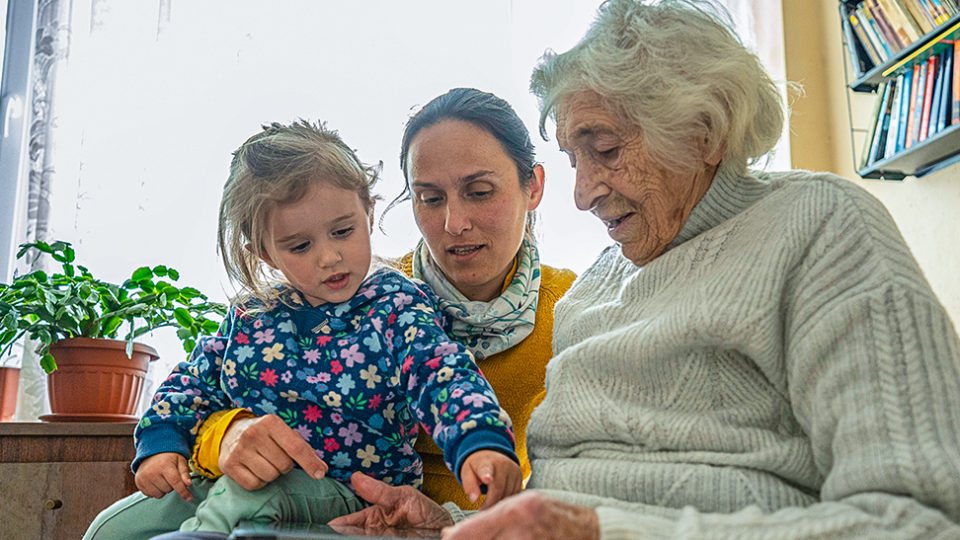Our Baptcare communities are full of exceptional residents with amazing stories to share. Grant is one such person, having enjoyed senior roles driving positive change for some of the most vulnerable people around the globe.
Now residing at Baptcare The Orchards aged care community, Grant shares his perspectives on life, it’s challenges and how a keen sense of values modelled by his parents and grandparents has guided his path.
Activism in action – an inspiring story
Grant has walked the corridors of power in Canberra, actively lobbying for the interests of some of the most marginalised people in the world – those living in developing countries. His work in support of the Jubilee 2000 campaign as its National Coordinator employed at TEAR Australia (now Tearfund) saw him fighting to free the world’s poorest countries from unpayable debts. He also helped establish and grow WaterAid Australia, bringing clean water and sanitation to developing countries.
It’s the kind of change making work that relies on public mobilisation activities and maintaining a high profile. Activities that led to meetings with key decision makers like Ken Henry, then Secretary of the Commonwealth’s Treasury Department and Alexander Downer, then the Minister for Foreign Affairs. Heady days that resulted in tremendous positive change for some of the most vulnerable communities around the globe. The Australian Jubilee 2000 petition garnered 375,484 signatures in support of a debt free start for people living in developing countries – one of Australia’s largest ever petitions.
After being presented by Grant and Father Brian Gore to Parliament House, the petition was then flown to Germany where it joined other petitions from around the world at the G8 Summit in Cologne. “The Summit agreed to cancel $US 45 billion worth of debt, which on top of previous commitments of $US 55 billion, totalled $US 100 billion of promised debt cancellation,” says Grant. It was a stunning achievement.

Grant’s commitment to social justice issues continues to pay dividends today. WaterAid Australia, which Grant helped found twenty years ago, continues to be a highly successful NGO, providing clean water, toilets and sanitation to marginalised communities. Grant’s contributions were honoured with a graduate internship program named after him. In 2019, he was made a Member of the Order of Australia for significant service to the community through social welfare initiatives.
Strong family values
What drives such determination to tackle some of the world’s toughest problems when it comes to poverty and disadvantage?
“My maternal grandparents, Roy and Ida, were a great source of inspiration and values,” says Grant. “They were keen Christians and churchgoers – good role models for me in how they lived their lives. Two of their best friends were involved in a group that set up the first women’s shelter in Hobart,” he says.
“I was also inspired by people who stood up for social justice – like Desmond Tutu and Nelson Mandela. I even named one of my sons after Nelson Mandela,” he laughs.

Grant remembers having discussions about politics with his father, Kevin. They would listen to ABC Radio, taking in the live feed from Parliament in Canberra. Thinking back know, Grant believes it’s a combination of these things that gave him a growing appreciation of social justice as a structural problem – and the vital role government must play in making the right decisions to overcome barriers to opportunity.
A journey of resilience
Overcoming barriers is something that Grant has great experience with, in his own life. With all his success, it’s hard to fathom that at one stage in his life, Grant struggled with basic reading skills. He credits his mother, Beryl, with not giving up on him and finding a method of learning that was more compatible with Grant’s needs.
When asked now, what he would say to anyone finding themselves in a similar circumstance – a child who struggles to read – Grant’s advice is simple. “It’s so important to have a persistent parent who is prepared to explore all possible solutions. My mum had a close friend who was a primary school teacher and they talked about the challenges I was having. They tried a phonics-based approach to reading – which worked really well for me. I was able to catch up with the rest of the class and never looked back,” explains Grant. “If you are unhappy with what is happening with your child, ask questions, find other options. Be persistent,” he adds with a smile.
Another challenge Grant has worked through is living with his worsening multiple sclerosis (MS). He was diagnosed in 2004, and following a significant deterioration in his illness, he and his wife, Helena decided that his needs would be met best at The Orchards residential aged care community. He moved into the community in 2019, to access the 24/7 support and registered nursing care that he needed. He describes a process of significant research and discussion taking place prior to choosing Baptcare including trialling respite at other places and group homes to test things out. “I stayed at Baptcare Strathalan aged care community in Macleod for a couple of weeks, too,” he explains. In the end, the decision came down to The Orchards having a room available to better support his mobility and nursing care needs.
Navigating transitions
The Orchards, in leafy Doncaster East, is immersed in nature, with a treed soccer park nearby, the Mullum Mullum Creek Trail and Yarra Trail. This environment is important to Grant, as a nature lover who connects with a special restorative power in bushland settings. Though wheelchair bound, he still gets out and about with the help of a Maxi-Taxi. In the last 12 months, he’s completed the Yarra Trail in stages and been all the way to the Royal Botanic Gardens. He explains how he planned the trail in segments, using the Maxi-Taxi to drop him off at the previous spot he got to, and continuing his adventure. Family and friends are always dropping in to see him and accompany him outside the The Orchards community, too. He leads a full and active life. As a self-described ‘mad keen Doctor Who fan,’ his room is decorated with Doctor Who merchandise along with photos of his family and of Tasmanian national parks.
It won’t surprise you either, to learn that Grant still has a burning interest in social justice issues. “Yesterday, I rang the Federal environment minister Tanya Plibersek’s office to express my concern about the slow process of drafting the new Environmental Protection Act,” he says. He’s also deeply concerned with the impact of new oil and gas projects on climate change, with particular interest on the plight of people on lower incomes. “It’s the people with the least resources that have done the least to contribute to climate change – and yet they are impacted disproportionately with rising sea and temperature levels,” he says.
His eyes are still burning bright at the injustice and his desire to continue to put pressure on decision makers to do the right thing is clear. Once a social justice warrior, always a social justice warrior! And we can all be grateful for that.
Thank you, Grant, – we are so lucky to have you as one of our residents and friends at The Orchards!
Community news
-

Tips for dealing with life in the sandwich generation
This is part two in our blog series on the sandwich generation. Here are some tips for dealing with the carer’s squeeze experienced by a growing number of Australians, particularly women. Key points: Summary of challenges facing the sandwich generation Tips for dealing with the challenges System reforms needed
- 11 Jul 2025
-

Meet Suraj | Hospitality Manager Residential Aged Care
What makes a residential aged care community truly feel like home? It’s the perfect blend of a warm, inviting atmosphere, devoted and compassionate staff, and thoughtfully crafted meals that foster an undeniable sense of belonging. Today we meet Suraj Ligade, Baptcare’s Hospitality Manager, to explore how his passion for care and culinary excellence nourishes both the bodies and spirits of our treasured aged care residents.
- 10 Jul 2025
-

The sandwich generation phenomenon unpacked
Welcome to the first of two blogs on the theme of the sandwich generation in Australia. In this one, we’ll cover the definition of the sandwich generation, the different types of caring that fall within it and some of the issues those in the sandwich generation face. The second blog will cover tips for dealing with life in the sandwich generation
- 02 Jul 2025

